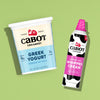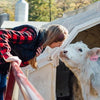
Impact in Depth
It takes more than quality dairy and craftsmanship to achieve Cabot’s award-winning flavors – it takes a village. From the hundreds of farm families in our cooperative who make our products possible, to every one of our employees, we’re all united in making our products a force for good in the world and on every table.
Environmental Highlights

1 NEW DIGESTOR
Building on the success of anaerobic digesters used on member farms, we partnered with PurposeEnergy to create a digester for our "neighborhood" of manufacturing facilities in Middlebury, VT. This new digester went live in 2024 and offers Cabot a more purposeful way to use the dairy processing byproducts which would typically be qualified as waste in cheesemaking. In addition to emissions reductions as a result of less trucking, this digester is anticipated to process 100,000 gallons of waste per day into clean water, renewable electricity, and natural fertilizer. It is expected to generate 8 million kilowatt hours of electricity annually, which is the equivalent of powering 800 households in a year.
1,444,487 kWh
We saved enough energy to power 131 homes for a year by improving our manufacturing, retail, and distribution centers through our partnership with Efficiency Vermont. That’s twice as much as 2023!
Farmer Highlights

~70% OF FEED PRODUCED ON MEMBER FARMS
Cabot farmers care about their animals and are committed to providing them with nutritious feed. Most of the food our cows eat is produced on member farms or grown locally within 100 miles, and more soybeans are being grown than ever before! Several soybean varieties are suitable to grow in the Northeast climate and are good sources of protein, fat, and digestible fiber. Similar to 2023, several of our farms were impacted by flooding and experienced crop loss and road closures in 2024. As climate events become more common in our region, farmers want to guarantee their animals have the food they need on the farm in the event a feed truck can’t get through. To mitigate risk, farms are diversifying what they grow and utilizing soil conservation techniques.
Community Highlights

186,412 POUNDS OF PRODUCT DONATED FOR HUNGER RELIEF
Cabot is proud to have donated 186,412 pounds of dairy products to VT Foodbank and other food related organizations in 2024. Altogether, that’s enough to fill five tractor trailer trucks! Our Cheddar for Better Program supported over 270 community events through in-kind product donations, as well as raised funds through add-on donations and benefit products for veteran's causes, adaptive programming, flood relief, and more.
PRINCIPLE 5 - EDUCATION FOR EVERYONE
Education is the fifth of seven cooperative principles that guides our co-op. In 2024, Cabot supported continuing education across the cooperative by offering learning opportunities for farmers and their employees. These included webinars hosted by our cooperative committees, training through the FARM Animal Care Program and participation in industry programs. Here’s how Cabot put Principle #5 into action in 2024:
Learning is also encouraged within the co-op. Our co-op members regularly participate in continuing education opportunities organized through committees, the FARM Animal Care Program, as well as industry opportunities:
-
Cabot's farmer led specialty committees hosted twenty-three webinars in 2024. Topics included farm succession planning, US Farm Bill updates, and fostering a positive workplace culture.
-
The Young Cooperator conference allows our farmers (18-40 years old) to learn about different technologies and practices being utilized on different farms through immersive tours and presentations.
-
As part of the required FARM Animal Care program, Cabot farmers and their employees complete 5 training courses related to stockmanship and other animal care management.
-
Three of our farmer members were selected to represent the USA in the 2024 U.S.-German Forum for the Future of Agriculture Transatlantic Exchange. Opportunities like these allow farmers from across the world to share knowledge and best practices.
Cabot also celebrates Principle #5 in our community through our free educational programs. These activities teach school-aged kids about life on a dairy farm, how to be a community leader, the importance of co-ops and much more. Over the last two decades, more than 450,000 school-aged children have participated from across the country.
https://www.eia.gov/tools/faqs/faq.php?id=97&t=3
Employee Highlights

18 FIRST PLACE AWARDS
Here at Cabot, we know it takes a lot of hard-working people to produce the award-winning dairy products you see on the shelves. From our Cabot farmers to our dedicated delivery drivers and everyone in between, these awards validate our commitment to making high-quality products. Cabot is proud to share that in 2024, we won 18 first place awards in national and international dairy competitions, including world’s best butter. Butter was the first product that we crafted and sold as a co-op over a century ago. That heritage of excellence extends to how we produce our butter today, churning it with Real Farm Power.
CHEESE PLEASE!
Cabot's employee appreciation program provides team members with Cabot brand favorites (like our mac and cheese shreds) and our latest and gratest (pun intended) innovations, like yogurt and the 10-year cheddar!
MPG MVP
Our transportation fleet is safe, efficient, and award-winning. Our transportation and logistics team brought home two awards in 2024. These awards highlighted our team’s commitment to workplace safety, efficiency, and creative problem solving. Our team is proud that we achieved a 4% higher MPG (6.68 mpg) than the national fleet truck average* and saw a 1.2% MPG improvement from 2023-2024. How did they do it? Through specific trainings designed to incentivize safe and efficient driving.
*Avg class 8 truck fuel efficiency is 6.4 mpg according to energy.gov census in 2023













